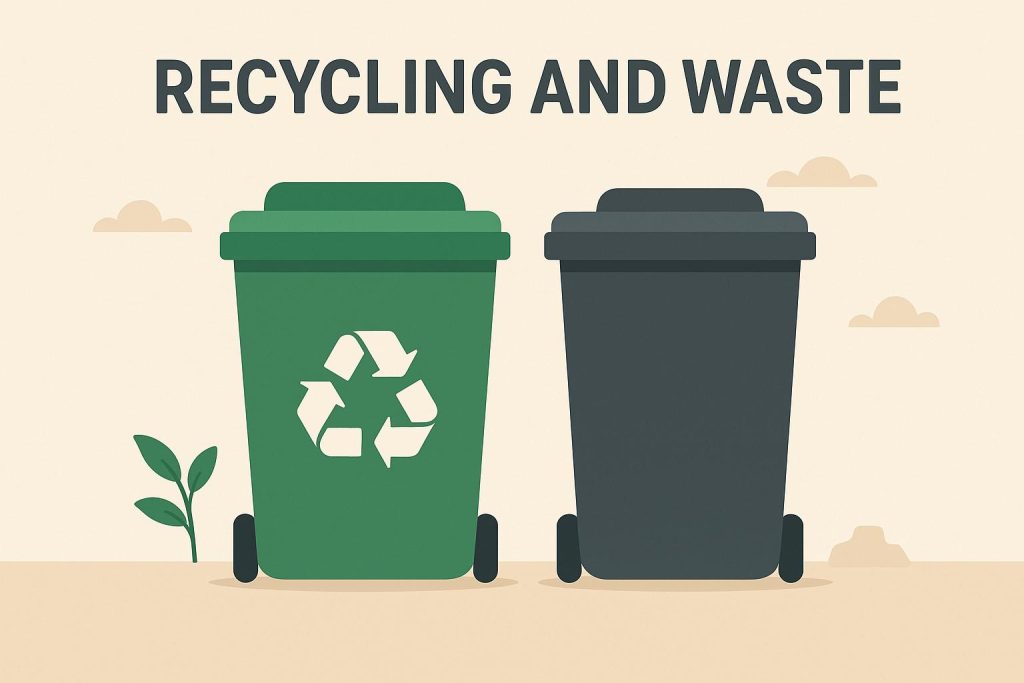
From April 2025, businesses across England will be required to separate recyclable materials from general waste under new government legislation. This marks a significant step towards improving recycling rates and reducing landfill waste. But what does this mean for businesses, particularly with smaller offices like ours at Stratus9 Consulting. Below we explore the implications and benefits of these changes.
What Are the New Rules?
The upcoming waste separation rules require businesses to separate key recyclable materials, including:
- Paper and card
- Glass
- Plastic and metal packaging
- Food waste (for businesses producing more than 5kg of food waste per week)
This brings business waste collection in line with household recycling practices. The aim is to increase recycling rates, reduce contamination, and promote sustainability across all sectors.
How Will This Impact Your Business?
For a smaller building surveying office, these changes may not seem as impactful as they would for a large organisation. However, there are still some key considerations:
Operational Adjustments
- Additional Bins & Storage: Offices will need to provide separate bins for each waste stream, which may require some minor reorganisation of office space.
- Employee Awareness & Training: Staff will need to be informed about the new procedures to ensure correct waste separation.
- Waste Collection Agreements: Businesses may need to review their waste collection contracts to ensure compliance with the new regulations.
Potential Costs
- There may be initial costs for purchasing additional bins and setting up a proper waste separation system.
- Some waste collection services could introduce new charges, although many providers may offer competitive rates for separated recyclables.
- A failure to comply could result in fines, meaning that businesses will need to ensure they are following the rules properly.
The Benefits of Compliance
Despite the logistical adjustments, there are several benefits to embracing this new legislation:
1. Cost Savings
- Many waste management companies offer lower fees for recycling compared to mixed waste collections, potentially reducing overall disposal costs.
- Less general waste means lower landfill taxes, benefiting businesses in the long run.
2. Enhanced Sustainability Credentials
- Demonstrating commitment to sustainability can enhance a business’s reputation and appeal to eco-conscious clients.
- Compliance with environmental regulations can be a valuable part of corporate social responsibility (CSR) policies.
3. A Cleaner, More Organised Office
- A structured waste management system can lead to a tidier office environment.
- Staff engagement in sustainable practices can promote a positive workplace culture.
How to Prepare Your Business
- Audit Your Waste – Assess how much waste your office produces and identify areas for improvement.
- Update Waste Contracts – Speak to your waste collection provider to ensure compliance with the new requirements.
- Educate Your Team – Hold a brief training session or provide simple guidance to staff on correct waste separation.
- Invest in the Right Bins – Clearly labelled bins will help make recycling straightforward and efficient.
Final Thoughts
While the new waste separation rules may require some initial changes, they ultimately bring long-term benefits for businesses, the environment, and society as a whole.
For a smaller office, the transition should be relatively straightforward with the right preparation. By embracing these changes, businesses can contribute to a greener future while also improving efficiency and potentially cutting costs.
Are you ready for the change? Start preparing now and turn waste separation into a positive step for your business!
